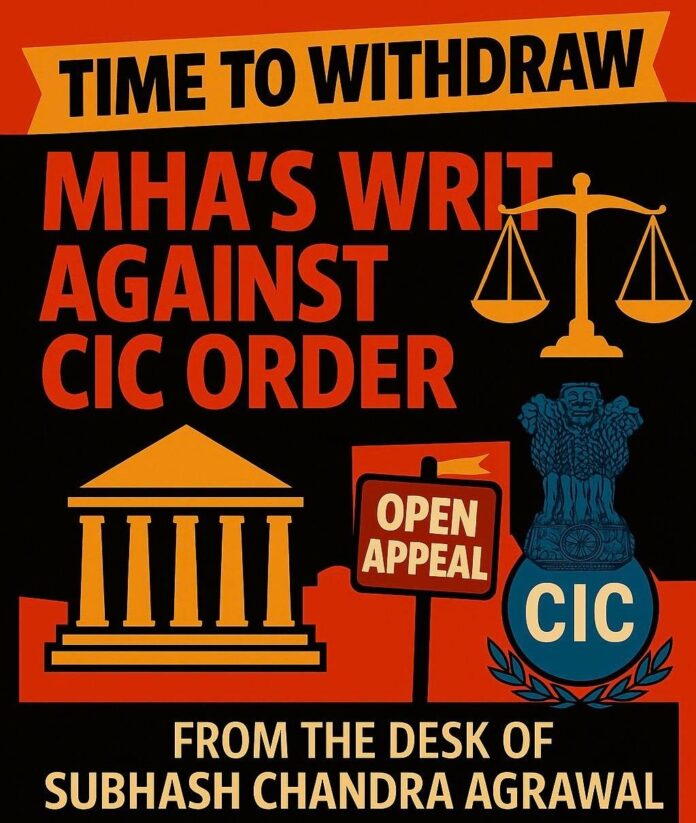An Open Apeeal From the Desk of Subhash Chandra Agrawal
The Ministry of Home Affairs (MHA) must reconsider its decision to pursue Writ Petition (C) 3483/2014 filed before the Delhi High Court against a Central Information Commission (CIC) verdict. The CIC had directed disclosure of file-notings on an MHA letter dated 15 March 2010, which had categorically stated:
“Because of the adverse media and other reports with regard to Mr Justice Y.K. Sabharwal, it was felt that the highly sensitive post of Chairperson NHRC may not be offered to him.”
Instead of allowing transparency in a matter of such profound national importance, MHA has sought to shield sensitive file-notings from public scrutiny—an act that goes against both the spirit of RTI and the public interest in judicial accountability.
JUDGE(COMPLAINT ENCLOSURES 13.12.2024)
Why File-Notings Matter
The file-notings are crucial not merely for personal reasons, but because they touch the core of judicial accountability and integrity. My complaint dated 13 December 2024 to the then Chief Justice of India was supported by documentary evidence highlighting judicial misconduct, nepotism, and bias that caused immense personal and family suffering over decades.
These documents reveal:
- A Delhi High Court judge failed to recuse despite being closely connected with the opposite party, even performing a marriage function at his official residence—violating the “Restatement of Values of Judicial Life.”
- Complaints filed in 2005 under the In-House Procedure were never acted upon.
- Justice Y.K. Sabharwal allegedly attempted repeatedly to elevate the same judge to the Supreme Court, stopped only when the then President Dr. A.P.J. Abdul Kalam returned the file.
- In an RTI response, the Supreme Court registry quoted Justice Sabharwal as dismissing my complaints as “without merit” without invoking the prescribed procedure.
- During his retirement-eve press conference in 2007, Justice Sabharwal devoted considerable time defending himself against these charges.
The MHA’s own admission in its 2010 letter only strengthens the case for full disclosure.
Human Cost of Judicial Misconduct
For nearly two decades, my family was subjected to judicial torture—with manipulated adjournments, denial of legal representation during strikes, and sudden withdrawal of legal counsel under influence. The toll was heavy:
- My late father was dragged into false litigation.
- I became diabetic under prolonged stress.
- My brother turned smoke-addicted.
- Nephews lost academic focus.
- We suffered severe financial losses from endless legal expenses and lost opportunities.
Such systemic harassment, patronized at the highest levels, left indelible scars on our family.
JUDGE(MHA YKS) 15.03.10 (2)Lessons from Public Outrage Cases
India has seen how public anger reopened justice in cases like Priyadarshini Mattoo, Jessica Lal, and Ruchika Girotra. Similarly, the bold suicide of 34-year-old Atul Subhash in December 2024—accompanied by a detailed note exposing corruption in the lower judiciary—has once again underscored the urgent need for transparency and accountability in higher courts.
A Call to Action
The MHA must immediately withdraw its writ petition and comply with the CIC’s directive. File-notings on Justice Sabharwal’s case are not just about one individual—they represent the larger national interest of preserving public trust in judiciary.
Furthermore:
- Benefits and pensions of tainted judges should be withheld pending fair inquiry.
- Assets transferred to families of those involved should be subject to confiscation if misconduct is proven.
- Victims of judicial misconduct deserve exemplary compensation.
Judicial chairs are not made of divine material—they are filled by human beings, capable of both fairness and bias. Shielding tainted practices only deepens public cynicism. If India is to restore faith in its justice system, the government must lead by example, beginning with the withdrawal of its writ petition and full disclosure of the file-notings on Justice Y.K. Sabharwal.
Only then can we move towards a judiciary that is not only powerful but also accountable to the people it serves.
News365 Times Upholds Ethics in Journalism
Carrying the Voice of Truth for Shri Subhash Chandra Agrawal
At News365 Times, we believe that journalism is not merely about reporting events but about standing firmly on the foundation of ethics, accountability, and courage.
Our commitment to truth compels us to highlight issues of national importance—especially when they are supported by credible documents and lived experiences. In this regard, we are carrying the article concerning the atrocities faced by our patron, Shri Subhash Chandra Agrawal, based on the physical documentary evidence in our possession.
This is not just about one individual. It is about the larger principles of transparency, justice, and integrity that every citizen of this country is entitled to. It is about resisting suppression, ensuring accountability, and upholding the values enshrined in our democracy.
By publishing this article, News365 Times reinforces its mission:
• To protect the dignity of individuals who have fought tirelessly for accountability.
• To shine a light on injustices, however uncomfortable they may be.
• To honor the truth, backed by documents, evidence, and ethical conviction.
We stand with Shri Subhash Chandra Agrawal, not only as our respected patron but as a tireless crusader for transparency and fairness. His voice—and the truth it represents—deserves to be heard.
Ethical journalism is our promise.
Truth is our only allegiance.
— News365 Times Editorial Desk
Subhash Chandra Agrawal
Guinness World Record Holder (Most Letters Written) | RTI Consultant
Email: subhashagrawal1950@gmail.com | Twitter: @subhashrti



